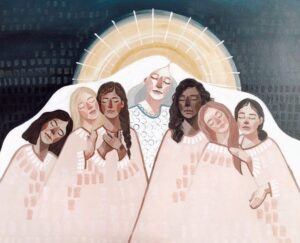
“In Her Image” by Amber Eldridge
Not long ago I heard a group of women talking about the “stereotypical woman”. Some women in the group were adamantly stating that they weren’t her and didn’t want to be her, others said that they felt pressure to be her, while several women said they’d been spending most of their lives trying to be her. There was real pain, anger, confusion and frustration in these women’s voices. Yet after about the eighth or ninth time they mentioned this “stereotypical woman” I wanted to jump into the conversation and ask these women what in the world they were talking about.
I wanted to ask them why they were wasting their time obsessing over an illusionary woman. I wanted to ask them if they knew that each person’s ideal is based off their own experience, their culture, their situation in life, the judgments they make, and how they perceive themselves viewed by other people. In truth, none of those women were talking about the same “stereotypical woman”; they each had a different stereotype constructed within their own head and it probably was not the same as the other women’s. No wonder they were miserable.
Stereotypes are illusions, dangerous ones, because they are not based on truth. In all their forms stereotypes destroy creativity, individuality, perpetuate injustice, and infringe upon agency. They are Satan’s counterfeit for the real thing– archetypes.
Stereotype: An unvarying form or pattern; specifically a fixed or conventional notion or conception, as of a person, group, idea, etc. held by a number of people and allowing for not individuality, critical judgment, etc.
Archetype: The original pattern, or model from which all other things of the same kind are made.
Can you see the big difference between these two words? A stereotype aims for things to be the same. Much like Satan wants us to all be the same– no agency, no individuality, no deviations from what he wants. He tries to teach us that we need to fit into a certain rigid form. He makes us believe that if we aren’t doing everything the man next door is, if we aren’t as “good” as the people in our church, or if we don’t dress or look like the woman down the street then our value decreases. Hell is paved with stereotypes, which is why we hate it so much when people stereotype us.
God on the other hand glories in diversity. You only have to take a brief glance at the world and it’s millions of types of insects, plants, and animals to discover that fact. Not one of God’s creations is exactly the same, they are each unique. Yet each monkey, tree, beetle, snowflake or person is derived from a divine archetype and possesses unique characteristics that make it what it is.
God has told us that for each thing he has created he has an original pattern. In D&C 29:31-32 we read that,
“…by the power of my Spirit created I them; yea, all things both spiritual and temporal-First spiritual, secondly temporal, which is the beginning of my work; and again, first temporal, and secondly spiritual, which is the last of my work—”
and in Exodus 25: 9 and 1 Chronicles 28:11-12 both Moses and Solomon were given divine patterns to follow as they constructed the tabernacle and the temple. Also in Hebrews 8:5 Paul explains that priests who serve in the temple,
“… serve unto the example and shadow of heavenly things.”
Everything– no matter how diverse it may appear– is made or fashioned after a divine pattern.
For example, there are 350,000 different species of beetles on the earth. When scientists discover a new type of beetle they look at certain archetypal characteristics it has that make it a beetle. In the case of a beetle scientists are looking for a sheathed wing and several other physical characteristics and traits. This means that the variety in beetles is huge, but that each one is unified by certain characteristics that fit the “pattern” scientists have defined for beetles.
By way of illustration, this is a rhino beetle
 and this is a lady bug
and this is a lady bug

they look totally different, are much different sizes, behave very differently, live in totally different parts of the world, and have totally different life experiences– but they are both beetles.
In a similar sense all men and women are created in archetypal images as well, the image of God. In Genesis 1:26-27 it reads,
“And God said, Let us make man in our image, after our own likeness…”
It is significant that God says that he makes man in “our” own image, implying that God is not a singular title but rather plural. We get further clarification on this a verse later when we read that,
“God created man in his own image, in the image of God created he him; male and female created he them.”
Right in the first verse of Genesis we learn that “God” is a plural title, that God is both male and female, and that man (also a plural title) is created in the image of God, male and female. In Hebrew the word for God used in Genesis is “Elohim” which is the plural form of “eloah” which means “God.” Almost always when the title of “God” is used in the Bible it is the plural form of the word. Our masculinity and femininity originates with God and is patterned after a divine archetype. Understanding and discovering that archetypes is the work of a lifetime and one for which all men and women are searching– whether they realize it or not.
I think the frustration and insecurities the women I was listening to talk about the “stereotypical woman” were coming from the feeling of being judged, or feeling like they had to fit into one of Satan’s stereotypes. They were trying to pattern their lives after flawed worldly principles and seeking after illusions of happiness. Instead, they should have been seeking to discover their archetypal qualities, discover in whose image they were created, and pattern their lives after eternal principles. I think Jeffery R. Holland also illuminated this concept well with his “Parable of the Homemade Shirt.” He said:
“… My mother, bless her, was a marvelous seamstress. In my childhood years, when money was short and new clothing hard to come by, she would sometimes make clothing for us to wear to school. I would see a shirt in a store window or in a mail-order catalogue, and my mother would say, “I think I can make that.” By looking at the shirt as closely as she could, she would then cut cloth and put in seams to a degree that was close to the expensive original.
I pay her tribute of being both willing and able to do that. But she didn’t like to do it that way. While she could study the commercial product and come close, what she really wanted was a pattern. A pattern helped her anticipate angles and corners and seams and stitches that were otherwise hard to recognize. Furthermore, if she went back for a second or third shirt, she was always working from a perfect original pattern, not repeating or multiplying the imperfections of a replica.
I think you can see my point and hers. We are bound to be in trouble if a shirt is made from a shirt that was made from a shirt. A mistake or two in the first product– inevitable without a pattern– gets repeated and exaggerated, intensified, more awkward, the more repetitions we make, until finally this thing I’m to wear to school just doesn’t fit. “
When we try to pattern our lives or our perceptions of masculinity or femininity on worldly or stereotypical images we find ourselves unhappy with the final product, because like Elder Holland said we’ve tried to make our shirt from a shirt that was made of a shirt that was made of a shirt. God has given us an original pattern to follow and He said,
“I will give unto you a pattern in all things, that ye may not be deceived.” (D&C 52:14).
Archetypes, divine patterns, are given to us to know the true way in which we should construct our lives, our families, and our understanding of manhood and womanhood.
Yet just because something is created out of the same pattern doesn’t mean that each one has to be exactly the same. When we free ourselves from the trap of stereotypical judgments and begin to focus on the divine pattern, we start to see our similarities rather than our differences. We begin to see as God sees, a world full of colors, sizes, smells, shapes, opinions, passions, talents, faces, and choices–all glorious– because they are all patterned after the divine.





Beautiful! You really hit the nail on the head.
It reminds me of the temple. Yes we all go there and are dressed in white, yet there are many different kinds of temple dresses-they all follow the patterns of the temple, but each is beautiful in its own way. We are all the same, yet we are all different.
Love this one today. It is such a good message. Thank you for all the work that went into preparing it.
Thank you, Heather. I can tell you work really hard to prepare your posts with scriptural and prophetic background. Your thoughts are inspiring.
Thanks Heather for this post.
A good friend of mine applied to compete for her own television show on a popular network. She prepared and prepared and wasn't chosen. She was disappointed and she had a moment of comparing her skills and talents to the others.
She wrote me recently to tell me a sweet story, that involved a "chance" meeting with a sister who had been inactive,and she invited her to come back to church. After a series of visits the sister made the decision to return and and also to receive her endowments.My friend was invited to accompany her. She said that she felt more fullfilment in helping the sister come back to the fold, then wishing for a "so called" dream life and job.
It can be self defeating to make unrealistic comparisons of ourselves to others. But when I find myself doing this, I stop myself and list all of the qualties I have that are pleasing to our Heavenly Father. It works for me, because I know that I am not what I will be, but I am an improvement on what I once was.I am a work in progress.
PROVERBS 21:2
2 Every way of a man is right in his own eyes,
But the LORD weighs the hearts.
3 To do righteousness and justice
Is more acceptable to the LORD than sacrifice.
4 A haughty look, a proud heart,
And the plowing of the wicked are sin.
5 The plans of the diligent lead surely to plenty,
But those of everyone who is hasty, surely to poverty.
Love this! Thanks for the insightful post.
This was really great. I think the more we talk about stereotypes, the more power we give them. I love how you point to the divine patterns instead. "True doctrine, understood, changes behavior" as Pres. Packer often says.
Thanks for sharing your thoughts.
I really loved this post. I really love all your posts, though I don't think I've commented before. I don't even remember how I found you…I clicked on a link, and then another, and then another…you know.
Anyway, I was reading today in Jesus the Christ (p.35) where Talmage says that Elohim being a plural title "connotes the plurality of excellence or intensity, rather than distinctively of number." I'm trying to align this in my mind with what you wrote about Elohim and man being plural titles (male and female) and I'm having a hard time even though I agree with both of these statements.
Do you have any insights/references/etc about that? I'd love to hear your thoughts. Thanks again for all the preparation and time you put into this blog.
Jennifer,
I went and read that quote you mentioned and it is a really beautiful statement from Elder Talmage. My understanding of what he is saying– and please realize that everything I write is my opinion and shouldn't be taken as hard doctrine– is that the name "Elohim" is a title and a name. The word itself is a plural word, but we don't know what it is plural of. All we know is that it plural of "eloah" which means "god". It could be that the title encompasses all of what God the Father is– just like a man's last name can be used to encompass his whole family. We could just say "The Tom Jones" and know that we were talking about Tom Jones but also about his family. In my opinion that is how I understand the name of Elohim. It IS God the Father's name, but it also encompasses his family and his glory, including our Heavenly Mother. I'm certain she has her own name (which we don't know) but we can also identify her with her husband, Elohim. It might also be used in the same way that the title "man" is used to connote all of mankind male and female. Elohim may encompass all of "godkind" both male and female.
This is really an interesting idea and I have to admit that it is one of the eternal mysteries that I am still pondering on. I can speculate but I don't know if I can give you a good clear answer. If you ever have any more enlightenment about I'd love to hear it! Thanks for reading and it is nice to "meet' you!